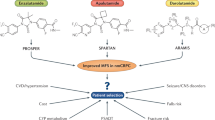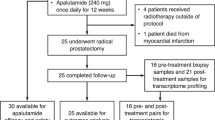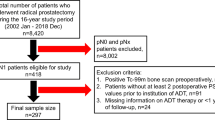Abstract
Background:
Intermittent androgen suppression (IAS) is an increasingly popular treatment option for castrate-sensitive prostate cancer. On the basis of previous data with anti-angiogenic strategies, we hypothesized that pan-inhibition of the vascular endothelial growth factor receptor using pazopanib during the IAS off period would result in prolonged time to PSA failure.
Methods:
Men with biochemically recurrent prostate cancer, whose PSA was <0.5 ng ml−1 after 6 months of androgen deprivation therapy were randomized to pazopanib 800 mg daily or observation. The planned primary outcome was time to PSA progression >4.0 ng ml−1.
Results:
Thirty-seven patients were randomized. Of 18 patients randomized to pazopanib, at the time of study closure, 4 had progressive disease, 1 remained on treatment and 13 (72%) electively disenrolled, the most common reason being patient request due to grade 1/2 toxicity (8 patients). Two additional patients were removed from treatment due to adverse events. Of 19 patients randomized to observation, at the time of study closure, 4 had progressive disease, 7 remained under protocol-defined observation and 8 (42%) had disenrolled, most commonly due to non-compliance with protocol visits (3 patients). Because of high dropout rates in both arms, the study was halted.
Conclusions:
IAS is a treatment approach that may facilitate investigation of novel agents in the hormone-sensitive state. This trial attempted to investigate the role of antiangiogenic therapy in this setting, but encountered several barriers, including toxicities and patient non-compliance, which can make implementation of such a study difficult. Future investigative efforts in this arena should carefully consider drug toxicity and employ a design that maximizes patient convenience to reduce the dropout rate.
This is a preview of subscription content, access via your institution
Access options
Subscribe to this journal
Receive 4 print issues and online access
$259.00 per year
only $64.75 per issue
Buy this article
- Purchase on Springer Link
- Instant access to full article PDF
Prices may be subject to local taxes which are calculated during checkout


Similar content being viewed by others
References
Eigl B, Trudeau M, Winquist E, Chi K, Eliasziw M, North S . A phase II study of sunitinib (SU) for maintenance therapy in metastatic castration-resistant prostate cancer (mCRPC) after response to docetaxel (D). J Clin Oncol 2011; 29 (suppl 7): Abstract 151.
Huggins C, Hodges CV . Studies on prostatic cancer. I. The effect of castration, of estrogen and androgen injection on serum phosphatases in metastatic carcinoma of the prostate. CA Cancer J Clin 1972; 22: 232–240.
Albrecht W, Collette L, Fava C, Kariakine OB, Whelan P, Studer UE et al. Intermittent maximal androgen blockade in patients with metastatic prostate cancer: an EORTC feasibility study. Eur Urol 2003; 44: 505–511.
De La Taille A, Zerbib M, Conquy S, Amsellem-Ouazana D, Thiounn N, Flam TA et al. Intermittent androgen suppression in patients with prostate cancer. BJU Int 2003; 91: 18–22.
Goldenberg SL, Bruchovsky N, Gleave ME, Sullivan LD, Akakura K . Intermittent androgen suppression in the treatment of prostate cancer: a preliminary report. Urology 1995; 45: 839–844; discussion 844–835.
Grossfeld GD, Small EJ, Carroll PR . Intermittent androgen deprivation for clinically localized prostate cancer: initial experience. Urology 1998; 51: 137–144.
Lane TM, Ansell W, Farrugia D, Wilson P, Williams G, Chinegwundoh F et al. Long-term outcomes in patients with prostate cancer managed with intermittent androgen suppression. Urol Int 2004; 73: 117–122.
Malone S, Perry G, Segal R, Dahrouge S, Crook J . Long-term side-effects of intermittent androgen suppression therapy in prostate cancer: results of a phase II study. BJU Int 2005; 96: 514–520.
Prapotnich D, Fizazi K, Escudier B, Mombet A, Cathala N, Vallancien G . A 10-year clinical experience with intermittent hormonal therapy for prostate cancer. Eur Urol 2003; 43: 233–239; discussion 239–240.
Spry NA, Kristjanson L, Hooton B, Hayden L, Neerhut G, Gurney H et al. Adverse effects to quality of life arising from treatment can recover with intermittent androgen suppression in men with prostate cancer. Eur J Cancer 2006; 42: 1083–1092.
Strum SB, Scholz MC, McDermed JE . Intermittent androgen deprivation in prostate cancer patients: factors predictive of prolonged time off therapy. Oncologist 2000; 5: 45–52.
Youssef E, Tekyi-Mensah S, Hart K, Bolton S, Forman J . Intermittent androgen deprivation for patients with recurrent/metastatic prostate cancer. Am J Clin Oncol 2003; 26: e119–e123.
de Leval J, Boca P, Yousef E, Nicolas H, Jeukenne M, Seidel L et al. Intermittent versus continuous total androgen blockade in the treatment of patients with advanced hormone-naive prostate cancer: results of a prospective randomized multicenter trial. Clin Prostate Cancer 2002; 1: 163–171.
Abrahamsson PA . Potential benefits of intermittent androgen suppression therapy in the treatment of prostate cancer: a systematic review of the literature. Eur Urol 2010; 57: 49–59.
Crook JM, O’Callaghan CJ, Ding K, Duncan G, Dearnaley DP, Higano CS et al. A phase III randomized trial comparing intermittent versus continuous androgen suppression for patients with PSA progression after radical therapy: NCIC CTG PR.7/SWOG JPR.7/UK Intercontinental Trial CRUKE/01/013. J Clin Oncol (Meeting Abstracts) 2011; 29 (Suppl 15) abstract 4514.
Dahut WL, Gulley JL, Arlen PM, Liu Y, Fedenko KM, Steinberg SM et al. Randomized phase II trial of docetaxel plus thalidomide in androgen-independent prostate cancer. J Clin Oncol 2004; 22: 2532–2539.
Figg WD, Dahut W, Duray P, Hamilton M, Tompkins A, Steinberg SM et al. A randomized phase II trial of thalidomide, an angiogenesis inhibitor, in patients with androgen-independent prostate cancer. Clin Cancer Res 2001; 7: 1888–1893.
Ning YM, Gulley JL, Arlen PM, Woo S, Steinberg SM, Wright JJ et al. Phase II trial of bevacizumab, thalidomide, docetaxel, and prednisone in patients with metastatic castration-resistant prostate cancer. J Clin Oncol 2010; 28: 2070–2076.
Picus J, Halabi S, Kelly WK, Vogelzang NJ, Whang YE, Kaplan EB et al. A phase 2 study of estramustine, docetaxel, and bevacizumab in men with castrate-resistant prostate cancer: results from Cancer and Leukemia Group B Study 90006. Cancer 2011; 117: 526–533.
Mao S, Daliani DD, Wang X, Thall PF, Do KA, Perez CA et al. Employing the treatment-free interval of intermittent androgen ablation to screen candidate prostate cancer therapies. Prostate 2007; 67: 1677–1685.
Figg WD, Hussain MH, Gulley JL, Arlen PM, Aragon-Ching JB, Petrylak DP et al. A double-blind randomized crossover study of oral thalidomide versus placebo for androgen dependent prostate cancer treated with intermittent androgen ablation. J Urol 2009; 181: 1104–1113; discussion 1113.
Bok RA, Halabi S, Fei DT, Rodriquez CR, Hayes DF, Vogelzang NJ et al. Vascular endothelial growth factor and basic fibroblast growth factor urine levels as predictors of outcome in hormone-refractory prostate cancer patients: a cancer and leukemia group B study. Cancer Res 2001; 61: 2533–2536.
George DJ, Halabi S, Shepard TF, Vogelzang NJ, Hayes DF, Small EJ et al. Prognostic significance of plasma vascular endothelial growth factor levels in patients with hormone-refractory prostate cancer treated on Cancer and Leukemia Group B 9480. Clin Cancer Res 2001; 7: 1932–1936.
Jain RK, Safabakhsh N, Sckell A, Chen Y, Jiang P, Benjamin L et al. Endothelial cell death, angiogenesis, and microvascular function after castration in an androgen-dependent tumor: role of vascular endothelial growth factor. Proc Natl Acad Sci USA 1998; 95: 10820–10825.
Kumar R, Knick VB, Rudolph SK, Johnson JH, Crosby RM, Crouthamel MC et al. Pharmacokinetic-pharmacodynamic correlation from mouse to human with pazopanib, a multikinase angiogenesis inhibitor with potent antitumor and antiangiogenic activity. Mol Cancer Ther 2007; 6: 2012–2021.
Sternberg CN, Davis ID, Mardiak J, Szczylik C, Lee E, Wagstaff J et al. Pazopanib in locally advanced or metastatic renal cell carcinoma: results of a randomized phase III trial. J Clin Oncol 2010; 28: 1061–1068.
Sonpavde G, Periman PO, Bernold D, Weckstein D, Fleming MT, Galsky MD et al. Sunitinib malate for metastatic castration-resistant prostate cancer following docetaxel-based chemotherapy. Ann Oncol 2010; 21: 319–324.
Dror Michaelson M, Regan MM, Oh WK, Kaufman DS, Olivier K, Michaelson SZ et al. Phase II study of sunitinib in men with advanced prostate cancer. Ann Oncol 2009; 20: 913–920.
Steinbild S, Mross K, Frost A, Morant R, Gillessen S, Dittrich C et al. A clinical phase II study with sorafenib in patients with progressive hormone-refractory prostate cancer: a study of the CESAR Central European Society for Anticancer Drug Research-EWIV. Br J Cancer 2007; 97: 1480–1485.
Aragon-Ching JB, Jain L, Gulley JL, Arlen PM, Wright JJ, Steinberg SM et al. Final analysis of a phase II trial using sorafenib for metastatic castration-resistant prostate cancer. BJU Int 2009; 103: 1636–1640.
Acknowledgements
This study was supported in part by the NCI Early Therapeutics Development with Phase II emphasis grant: N01-CM-62201 and DOD Prostate Cancer Training Award: W81XWH-08-PCRP-PRTA.
Author information
Authors and Affiliations
Corresponding author
Ethics declarations
Competing interests
Dr Posadas has received compensation from GlaxoSmithKline as a member of their speaker's bureau. Drs Ward, Karrison, Chatta, Hussain, Shevrin, Szmulewitz, O’Donnell and Stadler have nothing to disclose.
Rights and permissions
About this article
Cite this article
Ward, J., Karrison, T., Chatta, G. et al. A randomized, phase II study of pazopanib in castrate-sensitive prostate cancer: a University of Chicago Phase II Consortium/Department of Defense Prostate Cancer Clinical Trials Consortium study. Prostate Cancer Prostatic Dis 15, 87–92 (2012). https://doi.org/10.1038/pcan.2011.49
Received:
Revised:
Accepted:
Published:
Issue Date:
DOI: https://doi.org/10.1038/pcan.2011.49
Keywords
This article is cited by
-
Incidence of fatigue and low-dose corticosteroid use in prostate cancer patients receiving systemic treatment: a meta-analysis of randomized controlled trials
World Journal of Urology (2019)
-
Pharmacotherapeutic Management of Metastatic, Castration-Resistant Prostate Cancer in the Elderly: Focus on Non-Chemotherapy Agents
Drugs & Aging (2014)
-
Incidence and risk of hypertension with pazopanib in patients with cancer: a meta-analysis
Cancer Chemotherapy and Pharmacology (2013)
-
Intermittent Versus Continuous Androgen Deprivation Therapy in Advanced Prostate Cancer
Current Urology Reports (2013)



